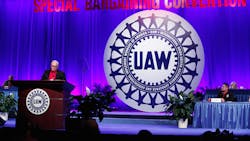The UAW issued a strike notice last night announcing that the 36,000 Fiat-Chrysler workers it represents would walk off the job if the company did not reach an agreement with the union by 11:59 p.m. tonight.
Fiat-Chysler’s contract four-year contract with the union ended in September. Sixty-five percent of FCA’s UAW workers rejected a new contract with the union last week.
FCA acknowledged receiving the notice and that it “continues to work with the UAW in a constructive manner to reach a new agreement.”
In a letter on the UAW Facebook page Tuesday morning, UAW President Dennis Williams said that union negotiators have heard members concerns “and are fighting to address your issues.” He calls Fiat Chrysler’s push for more production in Mexico “just nonsense.” Rejected plans called for a $5.3 billion investment in U.S. plants for SUV and pickup truck production but moving nearly all domestic car production to Mexico.
“We have been fighting NAFTA and other trade agreements every day and are still fighting,” Williams stated.
One sticking point in the negotiations is increased health care costs for union members. “We know that health care is a challenge because of the rising cost of medical and pharmaceutical benefits,” stated Williams. “We have always fought to keep from paying premiums and we will continue to do so.”
Williams in the past has floated the idea that active autoworkers’ healthcare spending should be in an independent cooperative fund, similar to the Voluntary Employee Beneficiary Association (VEBA) for retired UAW members’ healthcare. That would help automakers’ avoid a forthcoming 40% federal “Cadillac tax” on high-cost employer funded healthcare that is coming in 2018.
Union members have been wary of the co-op idea, and in Tuesday’s letter Williams said that “We DO NOT want another VEBA or a Taft-Hartley for active auto members. We believe that healthcare should be provided by the employer.
“What we do want is to find a way to use our collective numbers and knowledge to be ahead of healthcare inflation rather than to just wait for insurance and pharmaceutical companies to simply hand over a bill to fill their own pockets. That’s why we wanted to create an opportunity to work together, using centers of excellence, giving members a real choice for their families without passing on cost.”
The “centers of excellence” model would negotiate rates for high-cost procedures and stipulate which hospitals and healthcare providers workers could use in those cases.
Charles Bell, president of UAW Local 17’s Chrysler Council in Detroit, reported on UAW members’ top complaints about the contract after an October 1 meeting between Williams, the three UAW vice presidents, the bargaining team, and representatives from various locals. The union members’ major concerns included:
- The lack of a 25% cap on Tier 2 entry-level workers, so Tier 2 workers with more seniority could be bumped up to the higher Tier 1 pay. Of the three Detroit automakers, FCA has the most Tier 2 employees. Tier 2 pay currently tops out at $19 an hour (thought under the rejected contract it would rise to $24 an hour in four years), compared to $28 currently for Tier 1.
- Perceived lack of clarity around changes in the healthcare plan.
- The $3500 signing bonus, which is the same as in the 2011 contract.
- “No defined route” for entry level workers to reach the top pay of $28.33 per hour.
- Lack of product commitments in the United States, and concerns about more production shifting to Mexico
About the Author

Laura Putre
Senior Editor, IndustryWeek
As senior editor, Laura Putre works with IndustryWeek's editorial contributors and reports on leadership and the automotive industry as they relate to manufacturing. She joined IndustryWeek in 2015 as a staff writer covering workforce issues.
Prior to IndustryWeek, Laura reported on the healthcare industry and covered local news. She was the editor of the Chicago Journal and a staff writer for Cleveland Scene. Her national bylines include The Guardian, Slate, Pacific-Standard and The Root.
Laura was a National Press Foundation fellow in 2022.
Got a story idea? Reach out to Laura at [email protected]
